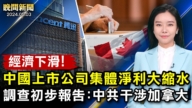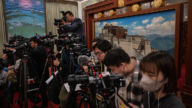【新唐人2011年7月27日讯】“国际货币基金组织”年度报告认为,中共当局应促使人民币升值,来对抗通货膨胀、房地产泡沫及不断减弱的货币控制能力,同样对改善中国人民生活水准和削减与交易伙伴的冲突,也是必要的。专家指出,人民币升值不会改变老百姓生活水准,老百姓受“通胀之苦”是由于垄断造成的。
利用公布对中国经济的年度评估报告的机会,“国际货币基金组织”敦促中共当局允许人民币升值,以应对不断恶化的通货膨胀和房地产泡沫问题,并且实施规划中金融改革,提振国内需求,改善中国百姓生活水准,和减少中国与交易伙伴的贸易冲突等相关问题。
对此,著名经济学家程晓农表示,“国际货币基金组织”之所以提出这样的建议,是因为他们不了解中国的情况,对中国的经济不了解造成的。
程晓农:“进口价格下降,人民币升值了,得好处的并不是老百姓,而是中国垄断的国营企业。因为他们操纵价格。‘国际货币基金组织’的错误在于,他误把中国当作‘市场经济’,其实中国是‘假市场经济’。老百姓受到通货膨胀的苦并不全是进口商品造成的,很大程度上是国民垄断企业垄断价格造成的
中国问题分析家伍凡先生则认为,中国经济面临的各种问题,说明以GDP为中心的生产模式,走到了死胡同。
伍凡:“还是以GDP为中心,还是以掠夺土地、掠夺资源、掠夺工人的工资,这样的一个掠夺性的主导思想。经济另外一个侧面,国家的税收,一个月的收入超过一万亿,税收的收入超过GDP增长速度3倍,而工人的收入、农民、普通民众的收入在GDP的总份量中在持续的下降,现在从12%下降到8%。”(声音来源:希望之声电台)
“国际货币基金组织”还认为,人民币被“大幅”低估。这个组织的一个磋商小组估计,人民币按不同计算方法被低估的程度在3%到23%之间。他们认为,由于中国央行印制大量人民币来购买美元,这让人民币兑美元的升值速度,无法达到在市场力量作用下本该具有的水准。
程晓农对此表示,由于中国货币储备过多,热钱进来过多,人民币的升值压力始终很大,中共当局允许小幅度升值,但是远远达不到国际社会认为应该达到的水准,所以离人民币对美元的正常汇率还是差的很远。
程晓农:中国现在本身就面临严重的通货膨胀,在这种情况下人民币进一步升值的话,中国(共)政府面临的压力就更大。所以中国(共)政府根本不可能听,他只是为了应付国际压力做一些小幅度的升值,应付差事。
像上个世纪80年代,日本日元升值过大,经济受到很大打击。中共当局害怕出现类似情况,一直坚持货币政策改革属于中国自己的主权问题。
“中国国家统计局”原总经济师姚景源最近指出,人民币大幅升值将挤压出口企业利润空间,抑制出口规模。他认为,如果人民币大幅升值,出口会受到打击,失业问题将立刻出现。
那么中国人民币汇率问题如何根本解决呢?
伍凡先生认为,中国只有把“出口经济”转变成“内需经济”,也就是必须增加老百姓的收入,必须让老百姓富裕起来,而不只是政府富裕。让老百姓得到好处,才能使社会稳定,也不需要那么多的“维稳费”,不需要那么多的镇压老百姓的机构,把经费用来增加国内的“生产基金”,这样才是社会的美好前景。
新唐人记者刘惠、宋风、薛莉采访报导。
IMF Urges RMB to Appreciate
The International Monetary Fund’s (IMF) annual report urges
the Chinese Communist Party (CCP)
to facilitate the appreciation of the RMB,
tackle China’s runaway inflation,
deal with its real estate bubble,
diminish its currency control,
improve people’s lives,
and reduce conflicts between its trading partners.
Some experts say that the appreciation of the RMB
will not change people’s living standards,
since the “inflation” people are suffering from
is the result of state-controlled monopolies.
The IMF’s annual report on China’s economy urges the CCP
to appreciate the RMB, tackle China’s rising inflation,
deal with its real estate bubble crisis,
implement financial reforms to boost domestic demand,
improve the lives of its people,
and reduce ongoing conflicts between its trading partners.
Cheng Xiaonong, a well-known economist, said that
the IMF made these suggestions,
because they do not know the real situation in China
or understand its economy.
Cheng Xiaonong: If China’s import prices drop
and the RMB appreciates,
the ones who benefit will be China’s monopoly enterprises,
not the people, as those monopolies control prices.
The IMF’s conclusion is wrong because
they mistake China’s ‘fake market economy’ for real.
The inflation people are suffering from
is not the result of imports, but of monopolies.”
Wu Fan, China issue analyst, believes that all the problems
that China’s economy is facing indicate that
the GDP-centered production mode has
reached an impasse.
Wu Fan: (The current production model) is GDP-centered
and is based on the idea of plundering
land, resources, and workers’ wages.
The state revenue,
another aspect of the economy,
is over RMB 1,000 billion per month,
which is three times of the GDP growth.
However, the proportion of the ordinary people
in the total GDP has decreased from 12 % to 8 %.”
The IMF also believes that the RMB is greatly undervalued.
A consulting group from the IMF estimates that according to
different calculations, the RMB is undervalued by 3% to 23%.
They believe that since the People’s Bank of China
mass prints RMB bills to buy USD,
the appreciation rate of the RMB cannot reach the level expected
under the current market forces.
Cheng said that
since China has too much currency reserve and “hot money,”
the pressure on the RMB’s appreciation is considerable.
The CCP allows for a slight appreciation,
which is far below international expectations,
so the RMB has a long way to go before
it reaches a normal exchange rate with the USD.
Cheng Xiaonong said: “China is facing a severe inflation.
Thus, if the RMB appreciates further,
the CCP will be facing even more pressure.
Therefore, it is not possible for the CCP to go along with
the international community’s wishes and advice.
However, facing international pressure,
the CCP has appreciated the RMB in token amounts.
Similar to the over appreciation of Japanese yen in the 1980s,
which greatly affected Japan’s economy,
the CCP is afraid that a similar situation would
happen in China if the Yuan appreciated.
Therefore, the CCP insists that currency reform is
a sovereign right issue.
Yao Jingyuan, ex-chief economist of State Statistics Bureau,
recently said that a large RMB appreciation will cut
export enterprises’ profit, thus lowering export volume.
He believes that a large RMB appreciation will hurt exports,
immediately resulting in widespread unemployment.
So how can the RMB exchange rate problem be solved?
Wu Fan believes that China should turn its export economy
into a domestic economy, which will increase people’s income
and make people rich rather than making the government rich.
Only by benefiting the people, can a society be stabilized.
Then there is no need of so much “stability maintenance fee”
or so many government agencies to suppress people.
Simply use the vast amounts of money that the CCP now holds
to produce goods in China, for the Chinese people,
which will in turn provide create a better future for the Chinese.
NTD reporters Liu Hui, Song Feng and Xue Li































